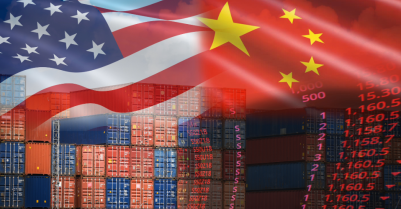-
View article
 #Economy
#EconomySouth Korea: a year after the political crisis, markets are buying the promise of stability
2025/12/17
- #Eco-trends
- 2020/06/30
- 0
-
2
Emerging countries: budget discussions in the time of COVID-19

The IMF has downgraded its global growth forecasts for 2020, casting a very painful light on the severity of the crisis: the institution expects Mexico’s economy to shrink by 10.5%, South Africa’s by 8% and Saudi Arabia’s by 6.8%. In truth, we find it hard to wrap our heads around these figures, and even harder to predict their economic and social consequences for countries not equally equipped to absorb the shock.
IMF downgrades
These downgraded forecasts also underscore the speed of the deterioration: for example, the Saudi economy had been forecast to contract by only 2% when the last report was issued in May. Lastly, the IMF has highlighted the risks for 2021, including the fact that the upturn will not be evenly distributed, raising questions over (among other things) how much scope there will be for economic policy stimulus – especially with many governments still urgently focused, for the time being, on supporting their economies in the very short term. How are you supposed to think about 2021 when you’re still battling to get through 2020?
On the monetary policy front, each week brings another raft of interest rate cuts, as we have recently seen in Russia, Turkey and Mexico. As we all know, central banks are on the front line in managing the crisis, dressed up as firefighters of last resort. The aim is not only to save the most vulnerable sections of their economies but also to manage expectations – i.e. confidence. If ever there was a key factor for the coming months, this is surely it.
However, some countries will soon run out of monetary ammo, especially given that emerging countries have less monetary room for manoeuvre than their more “developed” peers to live with negative interest rates. All of which raises big questions over fiscal policy, which is caught between competing demands.
A fiscal shock generating budget discussions
Almost everywhere you look, deficits are ballooning: to take just a handful of examples for 2020, South Africa’s forecast deficit is 14.6%, Saudi Arabia’s is 11.2% and Brazil’s is 9.3%. In the short term, the first question is obviously how these deficits should be financed; depending on what solutions are chosen, some countries will be more vulnerable than others a year or two from now. Countries like Brazil, which makes little use of external funding, will see outflows of domestic liquidity. This means bank financing will, in the medium term, be diverted away from the real economy, and this is bound to have an effect on already insufficient potential growth. Meanwhile, those countries that do turn to the markets for funding will face higher borrowing costs, making them externally more vulnerable if their currencies depreciate.
Oil-producing countries will obviously tap into their sovereign wealth funds, as is already happening, for example, in Azerbaijan and Kazakhstan – and, in fact, pretty much every other oil-producing country. It will thus be important to keep an eye on these countries, though in practice that is very difficult: with very few exceptions, these sovereign wealth funds are less transparent than they might be…
The other two questions that are coming up in the budget discussions underway in many emerging countries have to do with funding allocation and tax reform. Indeed, it’s vital not only to make the right expenditure choices but also to go where the money is: the wealthiest individuals. On the expenditure front, many draft budgets propose allocating more funding to strategic sectors, notably healthcare, as is the case, for example, in Egypt. Unfortunately, this will impact sectors not considered a priority, such as the monitoring of Indonesia’s many forest fires, and we can well imagine what might happen in the culture sector around the world…
Inequality debate set to heat up
The picture is perhaps a bit more encouraging as regards tax receipts. The fiscal shock triggered by the COVID-19 pandemic has forced out into the open longstanding debates that have often not been settled for political reasons: wealth taxes in various Latin American countries and Russia, taxes on bank deposits, etc.
At a deeper level, the disease and the resulting fiscal emergencies could succeed in forcing change on issues already highlighted by major events over the past few years and by the work of Thomas Piketty, whose global success speaks volumes: a degree of inequality that breaks down social and political cohesion as well as limiting growth potential.
And so, reading South African President Cyril Ramaphosa’s words about the country’s draft budget – “We must transform […] We can’t countenance ten million people out of work” – we find ourselves hoping that the emergency will change the rules of the game, as it seems to be doing in Europe. And this hope need not be a pipe dream. In fact, all of this is quite rational: for many governments, in a fiscal environment where the money needs to be found in any event, the door is wide open to address inequalities. Beware tax havens…
How can investment be maintained?
Finally, behind each of these debates, another debate is looming: how to attract private capital and stimulate investment in the face of what are likely to be severe constraints next year (notably higher taxes!). In this area, many governments – like Tunisia, for example – are saying they want to favour public-private partnerships. Or there is the example of Brazil, whose far-reaching new sanitation framework is reportedly smashing public corporations’ near-monopoly in the sector. However, the financial position of local authorities coming out of the crisis will not be conducive to these kinds of deals – especially in Russia, where regional deficits and debt are growing fast.
Here again, sovereign wealth funds will be called upon, with a growing proportion of their investment channelled into local projects. In fact, this was already a trend before the crisis: this proportion had already doubled since 2015, with the International Forum of Sovereign Wealth Funds estimating it at 21% of the total. So, even if sovereign wealth funds take advantage of the crisis to go on a shopping spree – as Qatar did after 2009 and as Saudi Arabia’s Public Investment Fund is doing now – they have and will continue to have an increasingly important role to play in supporting their domestic economies.
Tania SOLLOGOUB - Tania.SOLLOGOUB@credit-agricole-sa.fr








